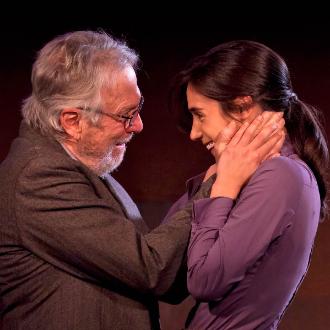The University of Miami Sue and Leonard Miller Center for Contemporary Judaic Studies, the George Feldenkreis Program in Judaic Studies and The National Jewish Theater Foundation (NJTF) will launch the ground-breaking digital Holocaust Theater Catalog (HTC) on October 7. The event will include a special screening of the acclaimed NJTF filmed play "The Soap Myth" from 6 p.m. to 9 p.m. that evening at the Cosford Cinema on UM’s Coral Gables campus.
The National Jewish Theater Foundation has designated the Miller Center at the University of Miami as the permanent home for its digital Holocaust Theater Catalog - a website project of the NJTF Holocaust Theater International Initiative (HTII). “The UM Miller Center and Feldenkreis Program are deeply honored to serve as the home of the unique Holocaust Theater Catalog and to make it electronically available to the world,” said Dr. Haim Shaked, director of the Sue and Leonard Miller Center for Contemporary Judaic Studies and of the George Feldenkreis Program in Judaic Studies in the UM College of Arts & Sciences. “It will fill a gaping void in Holocaust Remembrance projects and constitute an important building block in the educational work of the Center and Program.”
 |
|
A scene from filmed play "The Soap Myth," which is included |
This marks the first time that Holocaust theater has had a single home, akin to archives of diaries, books and artifacts maintained elsewhere. Holocaust theater, as a genre, includes productions from the time of the Holocaust, including those created in the ghettoes and concentration camps, as well as works about the Holocaust created after it ended. This publicly accessible, professionally overseen, web-based annotated list will include works from 1933 to the present.
“Although theater has played an extraordinary role from the 1930s to today in Holocaust awareness and education, there has not been until now a comprehensive theater initiative that has sought to make understood that body of work to Holocaust educators, officials, theatrical companies and the general public,” said Arnold Mittelman, NTJF president and HTC project director, and Dr. Alvin Goldfarb, holocaust theater scholar and retired president of Western Illinois University. “Now with this comprehensive infrastructure, NJTF/HTC users and their audiences/students will more richly understand through theater the complexity of the Holocaust and its legacy.”
The HTC will be particularly relevant to the Holocaust education programs of the Miller Center and the Feldenkreis Program, such as the unique Holocaust Survivors Support Internship that matches student interns with Holocaust survivors for two semesters in a program that has been described as “life-changing” for UM students.
“We are delighted to see the benefits of our support to the National Jewish Theater Foundation,” said Alberto Ibargüen, president of the John S. and James L. Knight Foundation. “Not only did it enable the creation of the Holocaust Theatre Catalog as a unique resource, but it helped connect it with the University of Miami, so the community can be better informed.”
In addition to more than 550 current titles and authors, entries include synopses, prominent production(s), experiences chronicled, publisher, rights holder, authors, country of origin, language, cast breakdowns, etc. – as much information as available for each work. After its launch, the catalogue will continue to be refined, updated and grown through the inclusion of new material submitted from worldwide sources in all relevant languages.
NJTF also will create unique educational programs, study guides and curricula, and endeavor to inspire creation, translation and increased production of Holocaust-related theater appropriate for all age levels.
The HTC was developed by an international research staff, overseen by a renowned Advisory Board and consulting scholars in Holocaust theater and Holocaust history. Ongoing research leadership was provided by Dr. Alvin Goldfarb, in collaboration with Arnold Mittelman, NJTF president and HTC project director; Dr. Michael Berenbaum; Dr.William Shulman and Dr. Haim Shaked. Contributing Holocaust theater scholars included Dr. William (Bill) Skloot, Dr. Gene Plunka, Dr. Lisa Peschel and Dr. Rebecca Rovitt. The development of this important and critically needed on-line resource was funded by grants to the NJTF by the John S. and James L. Knight Foundation and private donors.
October 01, 2014

